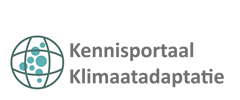Zuid-Holland climate adaptation strategy: towards a weather-resilient province
In 2018, the province of Zuid-Holland presented its climate adaptation strategy. The strategy shows how climate change is impacting the provincial taskings and responsibilities. In addition, the document outlines how the province is intending to join forces with its partners to better prepare Zuid-Holland for weather extremes and soil subsidence.
Zuid-Holland has great ambitions when it comes to a green, healthy living environment, good accessibility, and a dynamic economy. Even when the climate changes! The adaptation strategy is the result of an extensive exploration period, during which the provincial authorities have collaborated with a wide range of parties such as district water boards, drinking water companies, and security regions. The strategy seeks to link up with other major spatial taskings, such as the energy transition and house construction.
How has the strategy been established?
In 2017, a multi-disciplinary programme team was set up. This team was tasked with exploring the climate adaptation issue in collaboration with internal and external parties.
Mapping out vulnerabilities
The climate adaptation programme team commenced by conducting stress tests for each issue. The stress tests have mapped out the provincial vulnerabilities to climate change. The tests were conducted with the involvement of the parties relevant to each issue. Stress tests have been conducted for the built-up environment, the provincial infrastructure, the green living environment, and valuable bodies of water. Stress tests regarding the issues of an adaptive economy and resilience to weather extremes still need to be launched.
Identifying linkage opportunities
The team has made a list of other major spatial developments to take place in Zuid-Holland over the next few decades. The adaptation strategy has identified the following linkage opportunities:
- The energy transition;
- The housing construction tasking;
- Green/blue and nature development;
- Subsoil use (3D planning)
- Land use in peat grasslands
Partners for collaboration and dialogue
In parallel with launching the stress tests, the province has set up – partially new – collaboration structures focused on the climate adaptation issue. As a result, the topic of climate adaptation has now been placed on the agendas of several consultative bodies, such as the Climate-adaptive Construction Covenant and the collaboration with 82 housing corporations.
Provincial role and added value
Climate adaptation is, by definition, a tasking to be taken up collectively by governments, private parties, and NGOs. The team has explored options for the province to provide added value in the process of collaboration, dialogue, and the actual implementation of measures.
Result
The result is a Route map for each issue. With respect to each issue, the current situation has been outlined: Where do we stand now? Followed by the bottlenecks and opportunities. Subsequently, five routes have been defined for each theme: realisation by the province itself; connecting parties and taskings; promoting knowledge and innovation; effective investments; and new policy intentions.
Each “route” features recommendations for (policy) activities to be initiated by the province. Some of these tie in with agreements set down at the national level, some involve new ambitions for a climate-adaptive province of Zuid-Holland. The routes offer room for choices in terms of ambition levels or issue-related priorities. The strategy has been structured in a manner that enables the newly elected Provincial States to keep abreast of the progress made, and to determine the provincial commitment for its new term of office based on the routes. On this basis, the province will draw up an implementation agenda for the board term ahead.
Astrid de Wit: ‘Within no time, 40 parties joined the Climate-adaptive Construction Covenant initiated by the Province. Municipalities, but also parties from the construction sector and nature organisations. House construction is a key tasking in Zuid-Holland, which is why many parties are anxious to embark on future-proof construction methods.’
Lessons to be learned
-
It is important to properly define your own role as a province, and enter into collaboration with partners on this basis, in order to prevent confusion.
-
Knowledge exchange remains an issue because of the many parties involved in the topic all at the same time. At times, two bodies will be working on the same issue; this is something that cannot be avoided. Consider this a given. Should you come across such a situation, regard it as an opportunity for collaboration rather than a threat.
-
Soil subsidence cannot be dissociated from climate change. The two effects reinforce one another. Yet properly embedding soil subsidence in your adaptation strategy is a challenge.
-
Conducting stress tests turns out to be a useful first step for all the issues.
Contact person
Astrid de Wit
Provincie Zuid-Holland
a.dewit@pzh.nl
070 - 44 16 868
